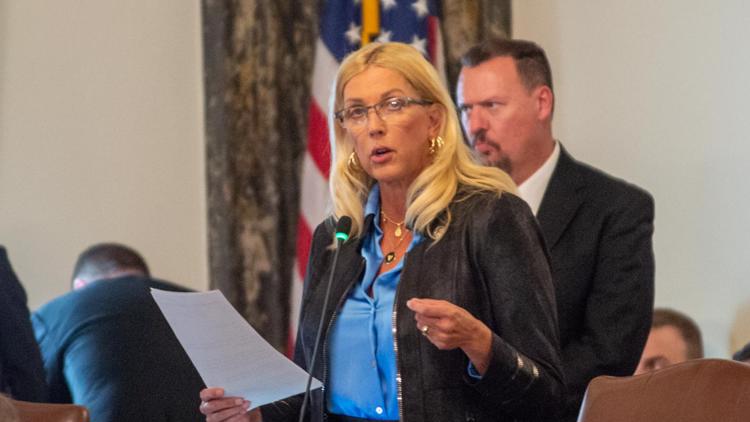SPRINGFIELD, Ill. — The Illinois Senate approved a measure on Thursday that would lift a 1980s-era moratorium on nuclear power plant construction.
Senate Bill 76, sponsored by Sen. Sue Rezin, R-Morris, was approved on a 39-13 vote. The bill now goes to the House of Representatives for consideration.
“The bill is going to come to the House with a lot of momentum,” Rezin said in an interview after the bill passed. “The unions are out and working their members to explain the importance of the bill and to just explain the technology.”
Rezin said on the Senate floor that the bill would specifically allow for the construction of small modular nuclear reactors, or SMRs. These reactors operate at a much smaller scale than traditional nuclear reactors and are built in factories and assembled on site. SMR proponents say they can be deployed in places like factories, replacing the need for things like coal-fired cogeneration plants.
“This is a large change in energy policy for the state of Illinois,” Rezin said. “It’s important to have a robust discussion and make sure the bill’s been vetted.”
Senate proponents of the bill, including Sens. Bill Cunningham, D-Chicago, and Patrick Joyce, D-Essex, said that lifting the ban would help the state attract investment in new technology.
Cunningham said the moratorium is preventing the state from “sending signals out to the market” for investment in new energy technology, including SMRs and using nuclear power for hydrogen generation.
“I’m here to make Illinois stay relevant, to make Illinois stay at the table,” Joyce said. “With the moratorium in place, we’re not even part of the conversation.”
Rezin noted during floor debate that the federal government has signaled support for nuclear reactors and made funding available for small modular projects. The Department of Energy has several grant programs for the development and demonstration of SMRs.
“By lifting this ban, it allows Illinois, should they choose, to go after federal dollars that are provided by this administration, the Biden administration, who is embracing, supporting and investing in advanced nuclear reactors,” Rezin said.
Sen. Ram Villivalam, D-Chicago, said the bill was “still not fully baked,” adding that the question of what is done with nuclear waste still doesn’t have a solution.
“Whether it’s one pound or a thousand pounds, it’s still nuclear waste,” he said. “We can’t wait for a national strategy, in my opinion.”
The state’s ban went into effect in 1987 and was intended to remain in effect until the federal government identifies a national nuclear waste disposal strategy. In 1987, Congress identified a site in Nevada as the nation’s repository for nuclear waste, although later opposition from the state and the White House quashed that plan. No national disposal site has been designated.
Some of the state’s largest environmental groups, including the Illinois Environmental Council, oppose the measure. Jack Darin, the head of the Illinois chapter of the Sierra Club, told Capitol News Illinois earlier this month that his organization doesn’t believe nuclear energy is “clean energy,” citing concerns over the environmental impact of nuclear waste.
David Kraft, the head of the Nuclear Energy Information Service, an anti-nuclear advocacy group based in Chicago, has said the bill will weaken the state’s landmark energy policy, the 2021 Climate and Equitable Jobs Act.
“Small modulars are not climate solutions, they’re not job generators until the 2030s and they’ll generate more nuclear waste,” Kraft said in a Thursday interview.
Kraft added he’s worried that lawmakers are not fully considering the safety implications of SMR technology.
The federal Nuclear Regulatory Commission has approved one SMR design, although no power plants using an SMR design are online in the United States. China and Russia both have SMRs of other designs online.
A similar bill was introduced in the House by Rep. Mark Walker, D-Arlington Heights. That measure, House Bill 1079, was approved in committee with a bipartisan majority, 18-3, although it hasn’t been heard by the full House.
Capitol News Illinois is a nonprofit, nonpartisan news service covering state government. It is distributed to more than 400 newspapers statewide, as well as hundreds of radio and TV stations. It is funded primarily by the Illinois Press Foundation and the Robert R. McCormick Foundation.
Watch more news, weather and sports on News 8's YouTube channel



